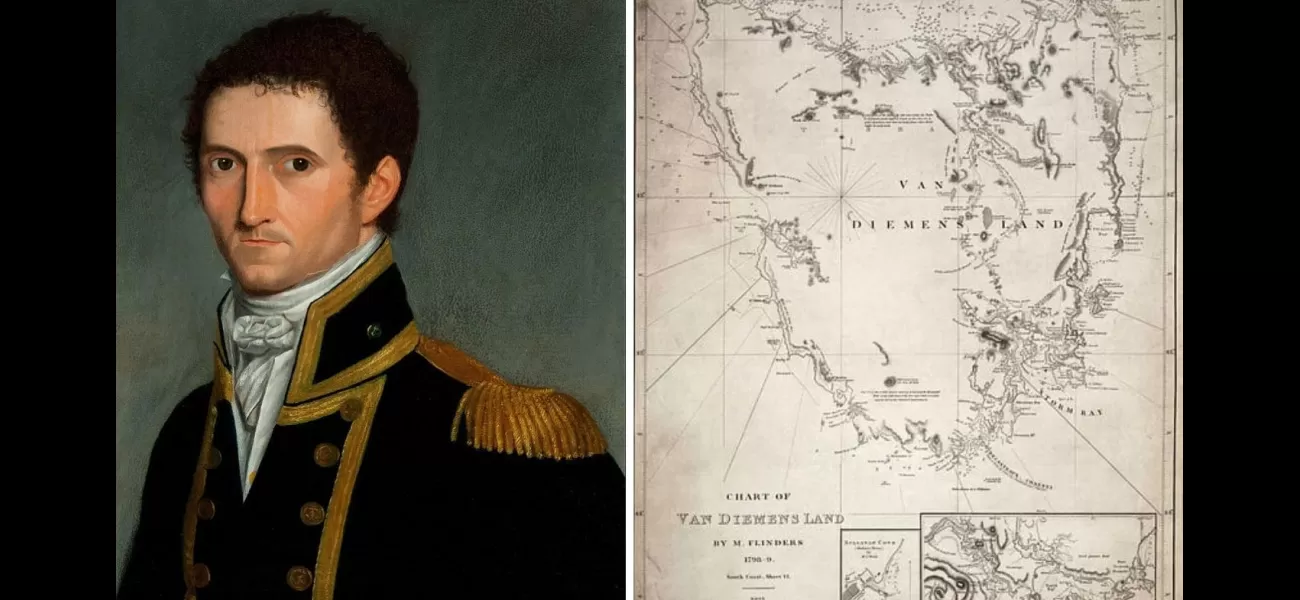After 250 years, the explorer who named Australia is finally returning home.
The remains of Captain Matthew Flinders, born in 1814, will be laid to rest in his English hometown, with Australians in attendance.
July 13th 2024.

This weekend marks a significant event in the world of exploration and history. The remains of the esteemed Captain Matthew Flinders, who is credited with mapping and naming Australia, will finally be laid to rest in the English village of his birth. People from all corners of the globe are making their way to Donington, located in eastern England, to attend the reburial on Saturday. Among the distinguished guests is the Governor of South Australia, Frances Adamson.
Flinders, who was born in 1774, made history by being the first person to successfully navigate around Australia while commanding the HMS Investigator between 1801 and 1803. He is also recognized by historians for naming the continent "Australia". A less commonly known aspect of this groundbreaking voyage is the crucial role played by an Indigenous man named Bungaree. Hailing from the Broken Bay area in present-day New South Wales, Bungaree accompanied Flinders on the entire journey, becoming the first Australian to circumnavigate the very land he was born on.
Bungaree proved to be an invaluable crew member, utilizing his language skills and diplomatic abilities to facilitate peaceful interactions with wary Aboriginal and Indigenous peoples. Whenever the HMS Investigator docked, Bungaree would step ashore and reassure the locals that the explorers meant no harm. Flinders held Bungaree in high esteem, stating in his writings that he was impressed by Bungaree's good nature, open-mindedness, and honorable conduct.
However, some critics argue that explorers like Flinders laid the foundation for the violent suppression of Indigenous peoples by British colonizers. Nevertheless, Flinders' legacy continues to be celebrated in Australia, with numerous landmarks and streets named in his honor. These include Flinders Bay, Flinders Ranges, Flinders Street railway station, and Flinders University. Sadly, in his birth country of Britain, Flinders is not as well-known as other explorers like Captain James Cook.
Flinders passed away in London on July 23, 1814, and was buried in St James' burial ground, along with 60,000 other individuals. However, his headstone was lost during the expansion of Euston Station in the 1840s, leading many to believe that his remains had also been lost. But in a surprising turn of events, his headstone was discovered during the excavation for the High Speed 2 rail network in 2019. Plans for Flinders' reburial were initially delayed due to the pandemic, but a group of determined campaigners from Donington were determined to see him finally laid to rest in his birthplace.
Eleanor Stevenson, a volunteer involved in organizing the reburial ceremony, expressed her excitement for the event, calling it "the biggest thing to ever happen" for their small village of 3000 residents. The local schools have even incorporated Flinders' story into their curriculum, and there has been a noticeable increase in tourism at St Mary and the Holy Rood Church, where his remains will be interred. The hope is that Flinders' final resting place in Donington will attract more tourists, historians, and maritime enthusiasts to the area.
Organizers have revealed that around 60 guests from Australia, as well as visitors from Mauritius, Belgium, and Germany, will be attending the reburial. Stevenson also mentioned that the discovery and return of Flinders' remains seem to have instilled a newfound sense of pride in the residents of Donington. The weekend's events have been meticulously planned by local volunteers, some of whom have dedicated themselves to the project on a full-time basis. Flinders' coffin, a replica of the one used during the 18th century, will be carried through the streets of Donington, with hundreds of people expected to watch. The coffin will be escorted by a team from the Royal Navy. It truly is a momentous occasion, 250 years after the birth of Captain Matthew Flinders, and Donington residents are hopeful that it will spark a renewed interest in his legacy.
Flinders, who was born in 1774, made history by being the first person to successfully navigate around Australia while commanding the HMS Investigator between 1801 and 1803. He is also recognized by historians for naming the continent "Australia". A less commonly known aspect of this groundbreaking voyage is the crucial role played by an Indigenous man named Bungaree. Hailing from the Broken Bay area in present-day New South Wales, Bungaree accompanied Flinders on the entire journey, becoming the first Australian to circumnavigate the very land he was born on.
Bungaree proved to be an invaluable crew member, utilizing his language skills and diplomatic abilities to facilitate peaceful interactions with wary Aboriginal and Indigenous peoples. Whenever the HMS Investigator docked, Bungaree would step ashore and reassure the locals that the explorers meant no harm. Flinders held Bungaree in high esteem, stating in his writings that he was impressed by Bungaree's good nature, open-mindedness, and honorable conduct.
However, some critics argue that explorers like Flinders laid the foundation for the violent suppression of Indigenous peoples by British colonizers. Nevertheless, Flinders' legacy continues to be celebrated in Australia, with numerous landmarks and streets named in his honor. These include Flinders Bay, Flinders Ranges, Flinders Street railway station, and Flinders University. Sadly, in his birth country of Britain, Flinders is not as well-known as other explorers like Captain James Cook.
Flinders passed away in London on July 23, 1814, and was buried in St James' burial ground, along with 60,000 other individuals. However, his headstone was lost during the expansion of Euston Station in the 1840s, leading many to believe that his remains had also been lost. But in a surprising turn of events, his headstone was discovered during the excavation for the High Speed 2 rail network in 2019. Plans for Flinders' reburial were initially delayed due to the pandemic, but a group of determined campaigners from Donington were determined to see him finally laid to rest in his birthplace.
Eleanor Stevenson, a volunteer involved in organizing the reburial ceremony, expressed her excitement for the event, calling it "the biggest thing to ever happen" for their small village of 3000 residents. The local schools have even incorporated Flinders' story into their curriculum, and there has been a noticeable increase in tourism at St Mary and the Holy Rood Church, where his remains will be interred. The hope is that Flinders' final resting place in Donington will attract more tourists, historians, and maritime enthusiasts to the area.
Organizers have revealed that around 60 guests from Australia, as well as visitors from Mauritius, Belgium, and Germany, will be attending the reburial. Stevenson also mentioned that the discovery and return of Flinders' remains seem to have instilled a newfound sense of pride in the residents of Donington. The weekend's events have been meticulously planned by local volunteers, some of whom have dedicated themselves to the project on a full-time basis. Flinders' coffin, a replica of the one used during the 18th century, will be carried through the streets of Donington, with hundreds of people expected to watch. The coffin will be escorted by a team from the Royal Navy. It truly is a momentous occasion, 250 years after the birth of Captain Matthew Flinders, and Donington residents are hopeful that it will spark a renewed interest in his legacy.
[This article has been trending online recently and has been generated with AI. Your feed is customized.]
[Generative AI is experimental.]
0
0
Submit Comment





